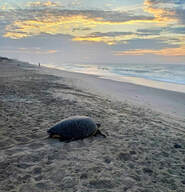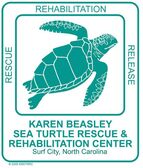|
by Karen Sota  The ladies are in the house – or actually on the beach. After a bit of a late start those turtle moms are finally here and our Topsail Turtle Project volunteers are out at dawn looking for signs of nests. Topsail is pretty much loggerhead territory, but the past few years have seen a green (possibly more than one) take a liking to our sand. Research has shown that our northern loggerheads do not reach maturity until about thirty-five years of age, so these ladies trudging through the sand are good-sized gals, many of them tipping the scales at around three-hundred pounds. They are not built for land travel, so you can imagine the effort involved in hauling yourself through the sand on flippers to find the perfect home for your babies. Believe it or not that’s the easy part! Once mom selects a spot, she digs out a nest about two-feet deep, using only her rear flippers. Then she deposits her clutch of eggs, which average about 100-120 a nest. After carefully filling and packing the nest with sand she uses her powerful flippers to fling sand all around the area to disguise her work. Then it’s the long haul back to the sea where she spends a few weeks of R&R before her next trip ashore. It’s normal for these gals to lay between one and five nests over the course of the summer. Our volunteers verify, mark and record data on every nest. If the nest has been laid in a vulnerable location (below the high tide line or in a high traffic beach area) they carefully remove and relocate every egg to a safer area. Since 2010 we have been participating in a research project at the University of Georgia (http://www.seaturtle.org/nestdb/genetics.shtml) that is tracking the nesting patterns of our northern loggerheads. One egg is harvested from each nest and the DNA and other data is recorded and analyzed. The results are quite interesting and show that sea turtles are indeed mysterious in their nesting habits. Some ladies nested several times in a small area of beach, while others were less discriminating and travelled up and down the eastern seaboard. These critters continue to surprise and amaze those of us who work with them. Although we have numerous eyes on the beach our visitors have always played a critical part in our work. Many times we have gotten calls in the night that “there’s a turtle on the beach.” There are some important things that you can do during nesting season to keep our ladies safe. • Do not harass a nesting turtle in any way. Not only is it illegal but you could cause her so much stress that she abandons the process and loses her eggs. Stay back, do not crowd or chase her or take flash photography. Keep pets away. • Keep beachfront lighting to a minimum. Turtles can become disoriented by bright lights and head off in the wrong direction. With the tremendous growth on the island, especially of massive rental properties even “normal” indoor lighting at night is proving to be a huge distraction to the nesting moms. Every year there are increased instances where mamas (and hatchlings) have gone over the dunes and ended up in parking lots and on the highways. • Do not leave heavy items (chairs, canopies, umbrellas) on the beach overnight. A turtle can become entangled in these. • If you dig a hole do not walk away without replacing all the sand. It’s dangerous not only to turtles but to humans who can stumble into it and break a bone (it’s happened.) Respect the nest and any instructions from our Topsail Turtle Project volunteers. They have all been trained in the proper procedures. We do encourage you to ask them any questions that you might have, however. If you spot a nesting mama, or anything unusual such as an injured or stranded turtle please call our Director of Beach Operations, Terry Meyer at: 910-470-2880. If she is not available, you may call the hospital during operating hours: 910-329-0222 . We will take the information and we will send a trained volunteer to meet you to assess the situation. The State of NC hotline for stranded, sick, and injured turtles is 252-241-7367. The state number picks up 24/7. Please note that all our work with sea turtles, at the hospital and on the beach, is authorized by the NC Wildlife Resources Commission, ES Permit 22ST05. Through June and July we will be open seven days a week: Mon – Fri, Noon-3; Saturday,10-2 and Sunday Noon-2. Tickets MUST be purchased in advance through our website: www.seaturtlehospital.org/visit.html. Select the date, time and the number of guests in your party and purchase your tickets. We limit the number of guests for each time to make the experience more enjoyable and to continue our commitment to keep you and our staff safe as we continue to respond to any changes in Covid. At this point masks are not required. Sorry, but we are not able to accommodate walk-ups for tours once we sell out for the day. Please keep in mind that summer traffic can be very heavy, especially on the weekends so plan your arrival accordingly. If you are coming only to our gift shop (not for a tour) you can enter through the single door to the left of the main entrance.
0 Comments
Leave a Reply. |
Archives
February 2024
Categories |

|
Quick Links |
Visiting Hours
THE TURTLES WELCOME YOU!
CLICK HERE FOR INFORMATION. ADMISSION (PLUS sales tax & fees): $7.00 General Admission (Ages 13-61) $6.00 Military (Active Duty and Veterans) $6.00 Seniors (Ages 62 and up) $5.00 Children (Ages 3-12) $0.00 Babies and Toddlers (Ages 0-2) (Babies are free but a ticket is still required to save their spot!) |
We are a 501(c)(3) Non-Profit Organization - POWERED BY VOLUNTEERS
EIN: 56-1967579
This conservation work for protected sea turtles at the Karen Beasley Sea Turtle Rescue and Rehabilitation Center and on Topsail Island is authorized by the North Carolina Wildlife Resources Commission, ES Permit 24ST05.
©
2024 Karen Beasley Sea Turtle Rescue & Rehabilitation Center
Powered by Volunteers!
Website Design by Loggerhead Designs
Powered by Volunteers!
Website Design by Loggerhead Designs

 RSS Feed
RSS Feed